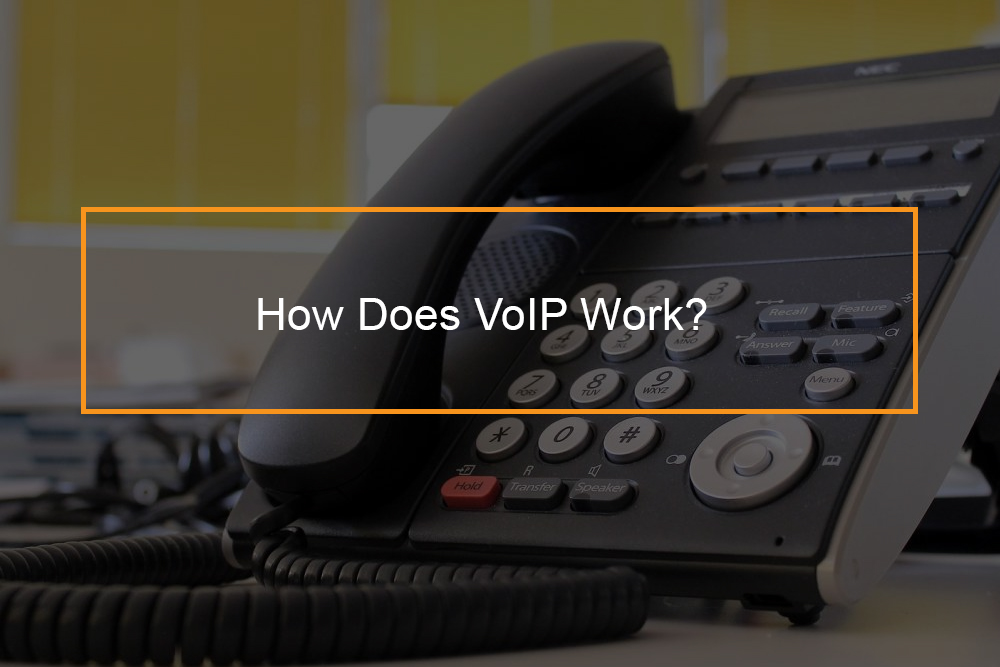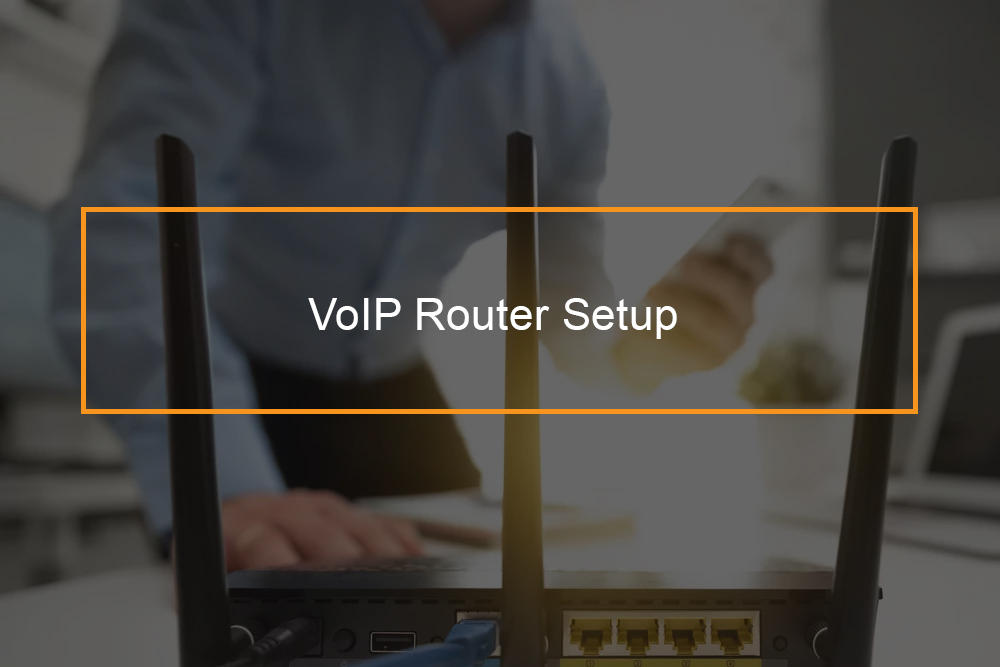 What is Voice over IP and how does it work?
What is Voice over IP and how does it work?
 VoIP technologies work by enabling traditional telephones services to operate via computer networks using packet switching protocols. Packet-switched puts VoIP voice signals into packets similar to an electronic envelope. Voice over Internet Protocol (VoIP) packets can be transmitted over VoIP compatible networks like local area networks (LAN).
VoIP technologies work by enabling traditional telephones services to operate via computer networks using packet switching protocols. Packet-switched puts VoIP voice signals into packets similar to an electronic envelope. Voice over Internet Protocol (VoIP) packets can be transmitted over VoIP compatible networks like local area networks (LAN).
VoIP is a revolutionary technology that can entirely rework business communication systems. VoIP, such as Vonage business cloud, has already been around for some time and is now growing steadily. Leading carriers such as AT&T are already setting up VoIP calling plans in several industries around the United States, and the Federal Communication Commission is looking at the possible ramifications of voice over ip VoIP services. This article is a guide to VoIP phones.
What is VoIP phones?
IP Phone Explained
Forget about copper wiring handsets, today, you can place and receive calls over the internet from anywhere, anytime using a handset, and Voice over IP. VoIP is the infrastructure that converts your voice into a digital signal, enabling you to make a call over the internet or another data-driven service. It is also referred to as internet telephony, IP telephony, broadband phone service and broadband telephony.
In simple terms, VoIP is a method of taking analog audio signals, such as the type you talk on the phone and changing them into digital data that can travel over the internet. It can convert a standard internet connection into a way to place free voice calls. The practical result of this is that by using some o0f the free VoIP solutions that are available to make internet telephone calls, you are bypassing the VoIP provider, and it charges, entirely.
How does a VoIP phone system work?
How VoIP system works?
VoIP operates much like any other data you send over the internet like Slack messages or email in that it changes voice communication into data packets and sends it over IP networks. VoIP software makes it unnecessary to have traditional phones lines installed in your residence or business since you can place calls using your internet connection.
One of the advantages of using a VoIP system for your communications, either as a residential VoIP or enterprise VoIP, is that it reduces the number of providers and solutions you require. Rather than having a different phone company and internet service, VoIP makes it possible to combine your internet service and voice into the same service. This is one reason that should inspire you to switch to VoIP from an analog phone. It is also much easier than traditional telephony to scale for growth or include new features that are essential to your business needs.
How does VoIP work for business phones?
There are many ways VoIP works for business. In some scenarios is uses hosted PBX, or any other kind of private branch exchange-based system while others it simply runs across your business local area network and is sent to the servers owned by your VoIP provider.
The process begins with your device. These SIP enabled devices are used to send and receive data over the VoIP telephone network. From there, your VoIP system can link to either Public Switched Telephone Network (PSTN) or SIP-enabled devices. However, it needs to travel through the router connected to your business LAN network first.
The router plays the main part5 in how you receive and make calls. With an analog telephone system, your phone is plugged into a hardwired copper line. VoIP is different than landline phones since it does not use the phone lines at all. Rather, it uses an internet connection which connects through router all onsite.
SIP trunking and VoIP
VoIP phones need a number of protocols to facilitate the delivery of voice communications over the internet. The most popular is H.323 and is used as VoIP protocol to support video, audio, and data communications across IP networks. It offers several VoIP functions, including bandwidth traffic management and call control.
Session initiation protocol (SIP) is a signaling protocol that configures up VoIP connections and is used as an alternative to H.323. SIP trunking acts as a direct line to your VoIP service provider rather than operating on the same internet connection as the other company data.
SIP trunking enables all voice communication to travel over a dedicated line. With a dedicated line only your voice data would run across it. This saves your leading LAN network for other workflow uses such as instant messaging, email, online faxing, downloading, and file uploading.
Is VoIP any good?
VoIP advantages
Since VoIP uses packets, much more data can be carried over the network to support and enable your business phone system needs. Besides traditional voice services, VoIP offers you access to advanced applications that can possibly help your employees to be more productive.
VoIP solution, which has been designed explicitly as an office phone, especially call center software, have evolved into unified communications services. Unified communications treat all communications- faxes, telephone calls, voice mail, web conferences, email, and more as discrete units that can be delivered through any means and handset, including cell phones, desk phone, and PC. Below are some of the advantages of VoIP business solutions.
Saves money
After you have a VoIP system up and running it will save you money. Companies can decrease calling costs by switching to VoIP services. Whereas traditional analog phones can have a lower upfront cost, they are more expensive to support, upgrade, and integrate with communications apps. IP phones also provide cheap international calling and long-distance, since VoIP phone calls are charged at the local rate of the call’s destination.
Business VoIP phone features
Besides saving you cost, VoIP phones have numerous phone features. However, accessibility to these features depends with your mobile provider, needs and your mobile call plan. For example, Vonage business and Nextiva packages offer different features at different prices. Also, a commercial entertainment service may opt for features such as sports packages and spectrum TV packages while a real estate company may opt for advanced calling features. Critical business features include:
- Call forwarding
This feature allows users to forward phone numbers to any device. From cell phones to laptops, call forwarding makes it easy to route calls to another destination.
- Hot desking
Hot desking is a business phone feature that allows users to log into a shared desktop app phone to access personalized settings and profiles. Hot desking is suitable for businesses with remote workers, field agents, and off-premise employees who only require occasional access to op-site smartphones.
- Call Parking
Call parking is another popular feature among companies. It allows a user the ability to place a call on hold, pick the call back up on another device or phone and move to another location.
- Voicemail to email messaging
A feature that grows steadily. Voicemail to email messaging is a transcription that listens to your voicemail, transcribes it, and then send it directly to your email.
- Auto-attendant
It is suitable for smaller companies that may not have the resources for a receptionist to direct calls. An auto attendant is an automated message that greets the customer and provides them an options menu.
- Business tool integration
Some VoIP contact center solutions include integration with business tools such as support ticket systems, email add chat to keep teams connected and working effectively.
Enhanced call quality
In case you have a stable internet connection with good data, you should experience call quality that is the same, if not better, a traditional phone connection. Besides, VoIP phones support HD voice, which uses a wider frequency spectrum to attain better voice quality during cellular phone calls.
In case you are in a rural area without a strong data connection, your qualities will suffer.
Disadvantage of VoIP phones
Whereas VoIP technology has many advantages, it has some disadvantages, as discussed below.
VoIP requires reliable internet connectivity
With VoIP phones, internet connection is a must. You cannot operate a VoIP phone system, not unless you have a stable internet connection with sufficient bandwidth. In case you are using a VoIP network, and the power goes out, you do not have access to the internet. This means you cannot use the phone.
However, you can use a speed test to assess what kind of VoIP service your internet connection can manage. This will help you to avoid latency. To test for VoIP connection quality, you can also try to find out the IP address of the gateway of your VoIP provider.
VoIP requirements
In case you are thinking of setting up a VoIP service, below are the requirements.
Bandwidth
You will require a reliable internet connection with an internet service provider(ISP). Depending on the kind of data and features you will be deploying, you may need more bandwidth than the standard. You can look at your bandwidth with a Voice over Internet Protocol speed test tool.
Devices
You should have a SIP device on an individual phone level, a router that enables you to connect your telephones to the IP network, and any other necessary equipment such as analog telephone adapters.
Make sure you have a VoIP provider
You need the right VoIP provider. Partnering with the right provider will make sure you have a seamless setup. Also, make sure that the price is within your budget. The amount you will spend on your Voice over IP includes a fixed-line rental fee, VoIP provider subscription, and additional costs.










